What is long-term housing?
Long-term housing involves providing housing for a student for a period as brief as a few weeks or as long as a few years. Most of the students requesting long-term housing from IFI are seeking to live with a volunteer or volunteer family for a semester or two at maximum, which is just a few months.
Long-term housing can be provided by the volunteer free of charge, or the volunteer may negotiate payment for rent, utilities, meals, transportation, etc. That is for the volunteer and student to decide.
IFI plays absolutely no part in the arrangements any volunteer may make with a student seeking long-term housing and vice versa.
Does IFI provide long-term housing for international students?
No. Despite a yearly increase in the number of students approaching IFI seeking to live with an American family, IFI does not currently have many volunteers who are eager to serve students in this way (see chart below). The volunteer families who have hosted long-term really enjoy the experience and the unique ministry opportunities long-term housing provides. We hope that in the near future, IFI will have the volunteers necessary to accommodate the growing number of students requesting to live with a Christian family on a long-term basis.
How do I help my student find long-term housing?
While IFI does not currently provide long-term housing with an American family, we can advertise the student's need and allow interested volunteers to contact the student to see if an arrangement can be made. Before we advertise the student's request, there is some important information we need from the student. You can view and print out the information IFI needs from the student here: Long-term Housing Request Form or you can have them contact the office by email here.
It is very important that students seeking long-term housing understand that the chances IFI will be able to find them a host family are very slim. It would be loving and wise to encourage your student to begin looking for an apartment while they wait. That way, they will have a plan B, should a search for a host family be unsuccessful.
What does IFI provide for students seeking to live with an American family?
IFI offers to advertise student requests for long-term housing to its volunteers about once a month (or so) by email. IFI will direct interested volunteers to contact the students for more details and/or to make arrangements. That is all IFI is able to provide students at this time.
Your student needs help finding an apartment.
In the list below, you will find a couple resources that will be of great assistance to your student. However, he/she will still need to do a significant amount of leg-work before signing a lease. IFI asks that you help point students in the right direction.
-
Off-Campus Living Guide - This is a very helpful publication of the Office of Off-Campus & Commuter Student Engagement. We highly recommend that students looking for off-campus housing download and review this 60-page pdf, which includes helpful information on a wide variety of subjects.
- OSU's Off-Campus Housing Online Tool - Search for campus-area apartments online.
- OIA's Permanent Housing Page - The Office of International Affairs also has some very helpful information for students about finding and obtaining permanent housing.
- Students of other universities should check with the school's Office of Student Life to find out what resources are available on their campus.
Your student wants a roommate.
- Students of other universities should check with the school's Office of Student Life to find out what resources are available on their campus.
Statistical breakdown of long-term housing requests
We display the graphs below to illustrate how great the need is for more people to volunteer to host students on a long-term basis. We firmly believe that this is a significant area of unmet ministry need.
Since long-term housing is not a service that IFI has been equipped to provide students, IFI just recently began keeping these records. The charts and numbers below, therefore, are a reflection of data beginning in December of 2010.


